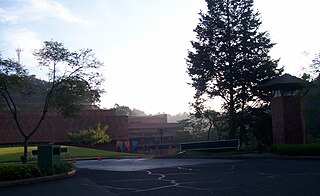
The University of Santiago, Chile (Usach) is one of the oldest public universities in Chile. The institution was born as Escuela de Artes y Oficios in 1849 by Ignacy Domeyko, under the government of Manuel Bulnes. It became Universidad Técnica del Estado in 1947, with various campuses throughout the country. In 1981, as a consequence of a reform on higher education under the dictatorship of Augusto Pinochet, it became what is now known as Universidad de Santiago de Chile, with all activities centered in a single 340,000 m2 campus in the capital Santiago.

The University of Puerto Rico, Río Piedras Campus is a public land-grant research university in San Juan, Puerto Rico. It is the largest campus in the University of Puerto Rico system in terms of student population and it was Puerto Rico's first public university campus.

The National University of San Marcos is a public research university located in Lima, the capital of Peru. It is considered the most important, recognized and representative educational institution at the national level. At the continental level, it is the first officially established and the oldest continuously operating university in the Americas, which is why it appears in official documents and publications as "University of Peru, Dean University of the Americas".
Education in Mexico has a long history. Indigenous peoples created institutions such as the telpochcalli and the calmecac. The Royal and Pontifical University of Mexico, the second oldest university in the Americas, was founded by royal decree in 1551. Education in Mexico was, until the early twentieth century, largely confined to males from urban and wealthy segments and under the auspices of the Catholic Church.

Universidad de las Américas Puebla, commonly known as UDLAP, is a Mexican private university located in San Andrés Cholula, near Puebla. The university is known for its programs in Finance, Arts and Humanities, Social sciences, Science and Engineering, and Business and Economics. It is considered to be one of the most prestigious universities in Latin America, having been ranked the best private and single-campus university in Mexico by the newspaper El Universal, as well as being one of the only seven universities in Latin America accredited by the Southern Association of Colleges and Schools. The UDLAP has also been very successful in Mexican collegiate sports; their teams are the Aztecas.

Francisco Marroquín University, also known by the abbreviation UFM, is a private, secular university in Guatemala City, Guatemala. It describes its mission as "to teach and disseminate the ethical, legal, and overall economic principles of a society of free and responsible persons."

The Central University of Venezuela is a public university located in Caracas, Venezuela. The university is widely regarded as the highest ranking institution in the country. Founded in 1721, it is the oldest university in Venezuela and one of the oldest in the Western Hemisphere. It is ranked 18th among the universities in Latin America.

The National University of Cuyo is the largest center of higher education in the province of Mendoza, Argentina.

The National University of Tucumán is an Argentine national university located in Tucumán Province and the largest in Argentina's northwest region. Founded on 25 May 1914 in San Miguel de Tucumán, access to the university is unrestricted and free of charge.
The Central American Technological University (Spanish: Universidad Tecnológica Centroamericana) (UNITEC) is a private coeducational institution with campuses in the three main cities of Honduras: Tegucigalpa, San Pedro Sula and La Ceiba.

The National University of Equatorial Guinea is a public institution of higher education, being one of the main universities of Equatorial Guinea in Central Africa.

Hugo Gunckel Lüer was a Chilean pharmacist, botanist, and university professor.

Universidad Autónoma Chapingo is an agricultural college located in Texcoco, Mexico State in Mexico. The university is a federally funded public institution of higher education. It offers technical and full bachelor's degrees as well as having scientific and technological research programs. Many of these programs are related to agriculture, forestry and fishing.

The Universidad Nacional del Altiplano de Puno is a public university located in the city of Puno, Peru.

The Pontevedra campus is one of three campuses that host the University of Vigo. It is located in the Spanish city of Pontevedra and offers undergraduate, postgraduate and doctoral studies in Social sciences, health sciences, arts, engineering and Sports.

The Faculty of Veterinary Sciences, also simply known as Veterinaria, is a faculty of the University of Buenos Aires (UBA), the largest university in Argentina. It was founded as an autonomous faculty in 1972, when it was split from the Faculty of Agronomy and Veterinary Sciences, which was originally founded in 1904 as the Instituto Superior de Agronomía y Veterinaria.

The Faculty of Economic Sciences, also simply known as Económicas, is a faculty of the University of Buenos Aires (UBA), the largest university in Argentina. Established in 1913 as the Instituto de Altos Estudios Comerciales, it is now the largest faculty within UBA, with over 36,000 grad students. The Faculty of Economic Sciences has the highest rate of international postgraduate students at 30 percent, in line with its reputation as a "top business school with significant international influence."















